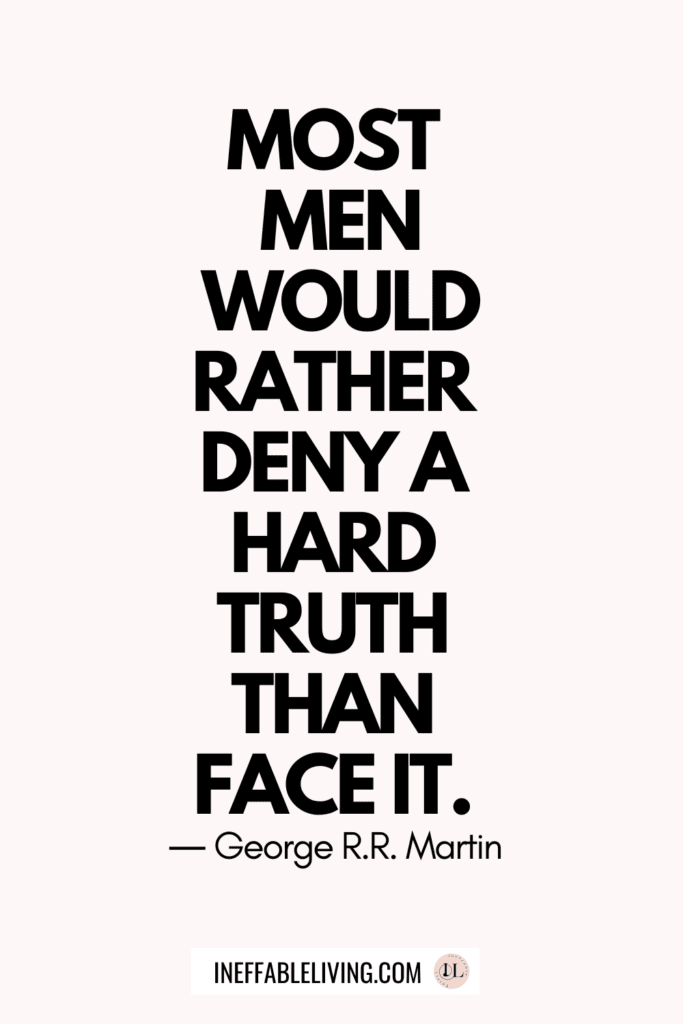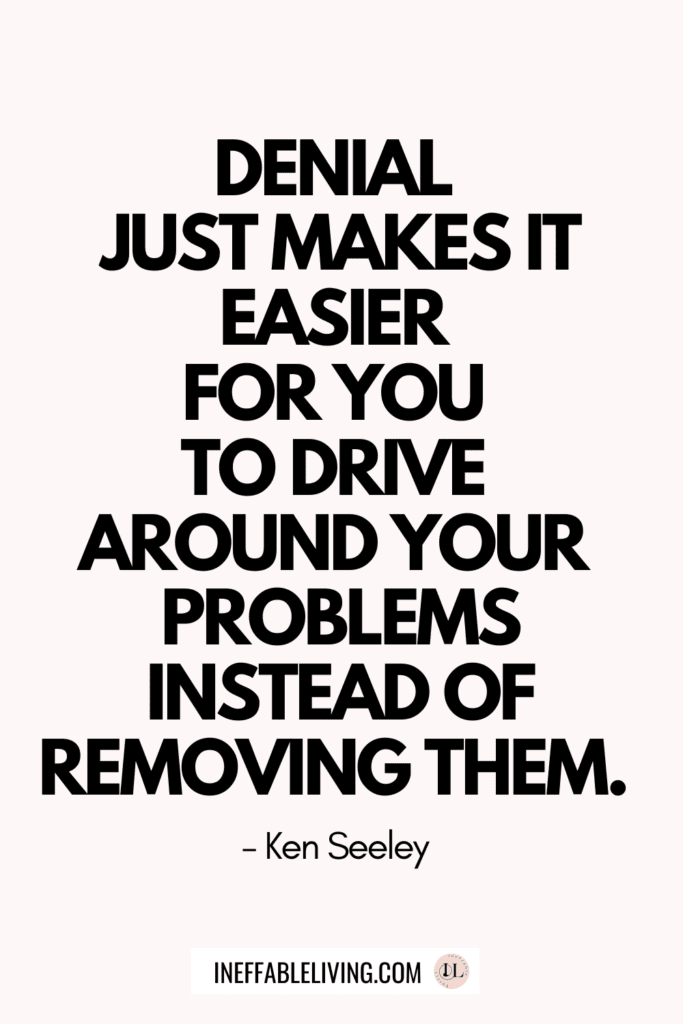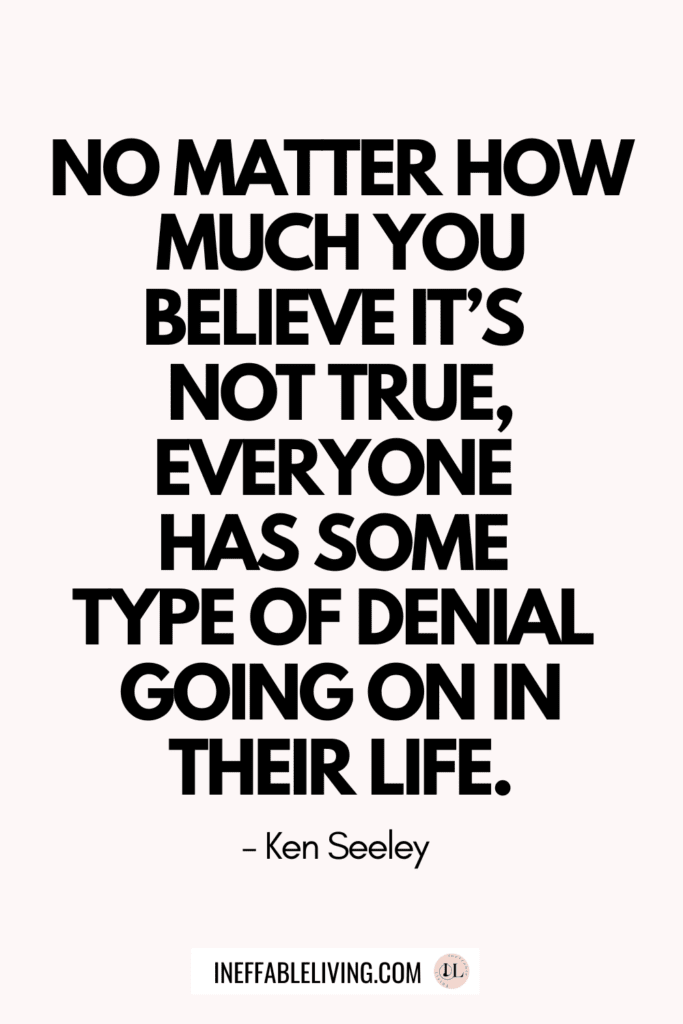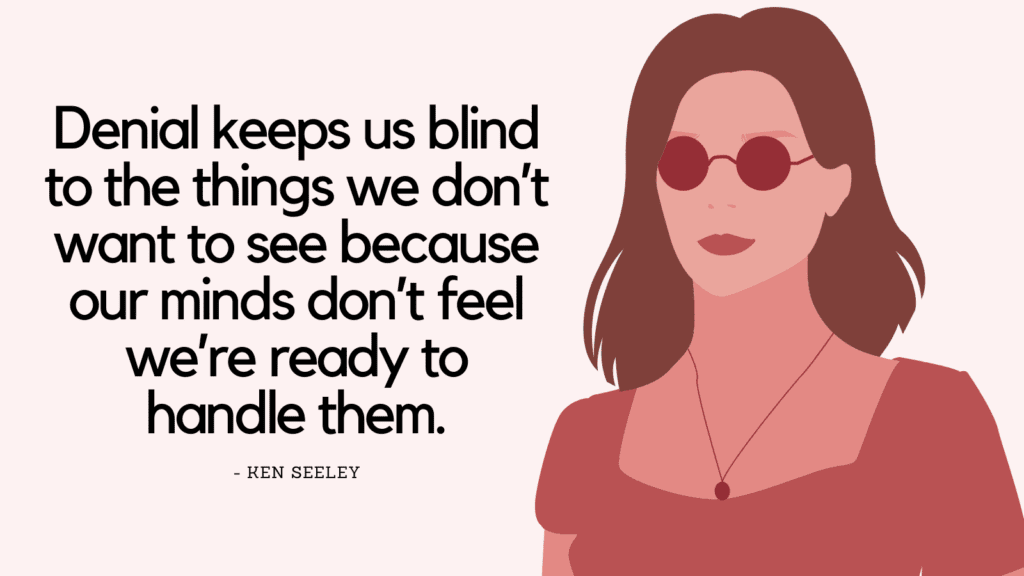This post contains some of the best denial quotes.
Denial Quotes
1. “Most men would rather deny a hard truth than face it.” ― George R.R. Martin
2. “Denial is also self-reinforcing – once you make the first denial, you tend to commit to it: you will deny, deny the denial, deny that, and so on.” – Robert Trivers
3. “One of our most primitive defensive reactions, denial is an un conscious and natural coping mechanism that allows us to refuse to identify or acknowledge the existence or significance of unpleasant external circumstances or internal feelings and thoughts.”- Ken Seeley
4. “By allowing us to ignore distressing situations and essentially distort how we see reality, denial is a psychological survival strategy that our brains set in motion in order to give us time to adapt to and heal from a wide assortment of threatening conditions, such as pain, stress, anxiety, and traumatic feelings or events.”- Ken Seeley
5. “Simply put: denial keeps us blind to the things we don’t want to see because our minds don’t feel we’re ready to handle them.”- Ken Seeley
6. “A little bit of denial in your life can actually be beneficial, but it’s an unconscious reaction that has a way of growing or sticking around a lot longer than it needs to.”- Ken Seeley
7. “When left unchecked, denial can be incredibly toxic if it prevents you from dealing with problems or issues that demand immediate action or change, especially when those problems or issues are affecting your life in an unhealthy way.”- Ken Seeley
Related: How To Step Out Of Denial? Top 10 Steps To Overcome Denial When The Truth Is Heartbreaking

8. “No matter who we are—regardless of our background, education, financial status, race, nationality, and sex—we are all not just susceptible to denial but actually in some form of denial at all times.”- Ken Seeley
9. “The mistake most people make is in thinking that denial is lying in wait until some major catastrophe shakes it loose and forces it to take control. In actuality, denial is always present. It operates 24/7 in all of us on some conscious or unconscious level, blurring or blocking our perception about the behaviors, actions, thoughts, events, and emotions in our lives that are hazardous.”- Ken Seeley
10. “What you’re in denial about can range from the trivial to the traumatic. But you are in denial—at this very moment—about something.”- Ken Seeley
11. “And no matter how unimportant that something may seem, sustaining your denial about it is detracting from other areas of your life that may be withering away.”- Ken Seeley
12. “Right now, denial is at the heart of something negative happening to you, if not several negative things happening to you at once. If you’ve ever felt that your life isn’t running as perfectly as you always thought it would, denial may be to blame.”- Ken Seeley
13. “Most important, if you feel that something is missing from your life but you just can’t put a finger on what it is, then it isn’t that you’re probably in denial—you’re definitely in denial.”- Ken Seeley
Related: How To Stop Bad Habits And Addictions?
14. “What makes denial difficult is that it leaves you clueless that you’re unconsciously letting something unhealthy into your life. But what can make it deadly is that it prevents you from getting the help you need—or allowing those who love you to help you.”- Ken Seeley
15. “Yes, you are in denial about something, but no, you’re not stuck in denial forever. Or, I should say, you don’t have to be stuck in denial forever.”- Ken Seeley
16. “Denial is something your mind builds all around you, brick by brick, so that it blocks your view from all sides. Every time you turn a blind eye to a problem—whether one of your own or someone else’s—you’re laying down a brick.”- Ken Seeley

17. “Denial is a process that keeps going and going and going until all you’re left with is a seemingly impenetrable wall you can’t see over or get around. This wall completely shields you from the helpful opinions of others, the consequences of your own actions, and the reality of your situation.” – Ken Seeley
18. “Denial just makes it easier for you to drive around your problems instead of removing them. The real issue in your life—which is somewhere in the following five lists—is still sitting there in the middle of the road, causing a mini–traffic jam that’s keeping your life from moving forward.”- Ken Seeley
Related: How To Achieve Emotional Sobriety? (+FREE Emotional Sobriety Worksheets)
19. “When you let denial happen—instead of trying to find it and remove it so you can face your problems head-on and beat them— you’re choosing to live in a darkness that’s actually changeable.”- Ken Seeley
20. “Denial and abuse go hand in hand. Denial can blur the perception of the person who is abusive, the perception of the person who is being abused, or the perception of both individuals at the same time.”- Ken Seeley
21. “Denial can hide any of the myriad issues, behaviors, feelings, and attitudes that all of us have a problem with at one time or another. It’s how you choose to handle each of these problems when it enters your life that shows whether you rely on denial to hide your problems or whether you are comfortable in addressing them.”- Ken Seeley
22. “If you accept the truth when it comes at you, it’s much easier for you to address it—or even embrace it. But if you doubt the truth when it’s presented to you, then even if you’re an otherwise well-balanced person, you can quickly and unexpectedly find yourself using denial to cover up the facts.”- Ken Seeley
23. “No matter how much you believe it’s not true, everyone has some type of denial going on in their life. Denial ranges from covering up something so insignificant that it doesn’t seem to affect one’s life in a major way to shrouding an immense and potentially toxic secret.”- Ken Seeley
24. “When your life is in perfect balance, it’s impossible to be in denial because being in denial would mean you’re consciously or unconsciously refusing to admit the existence of a problem in your life.”- Ken Seeley
Related: Are You Addicted To Your Phone Quiz (+Digital Detox Challenge)
25. “Because denial has a way of making you believe you aren’t doing anything unhealthy, each and every minute you spend doing something negative means another minute not spent doing something positive. This creates the same vicious cycle—everything healthy in your life begins to shrink while everything unhealthy in your life continues to grow.”- Ken Seeley
26. “The person in denial about losing his hair may end up avoiding certain healthy situations—like a fun party, a dream date, or any opportunity to meet new people—just because he doesn’t feel comfortable about his appearance and can’t admit it.”- Ken Seeley

27. “And the person in denial about being addicted to caffeine must be overly tired for a reason, whether lack of sleep or a need for an extra boost of energy to keep on top of her job or other nonstop demands in her life.”- Ken Seeley
28. “At its root, denial may be a defense mechanism that we all use to shield ourselves from the things we don’t want to face head-on, but we don’t all share the same motives for using it.”- Ken Seeley
29. “Staying in denial lets deniers turn a blind eye to all of that effort, so that they can go about their less-complicated lives—even though the reality is that denial is making life far more complicated for them than it has to be.”- Ken Seeley
30. “For some deniers, it’s not that they don’t want to deal with their problems—it’s that they don’t know how.”- Ken Seeley
Related: Porn Addiction Test (+Best 6 Tips On How To Get Free From Porn Addiction)
31. “Denial is an effective psychological mechanism for dealing with distressing situations. By choosing not to believe the bad or dreaded thing is happening, a person can avoid distress completely. Difficulties may arise as it becomes harder and harder for them to ignore evidence that something is seriously wrong: if they have not accepted any bad news at all, then nor have they made any emotional adjustment for it.” – Kathryn Mannix
32. “All neurotics, including narcissists, use this mechanism of deadening parts of the body to suppress feelings. One can set one’s jaw to block an impulse to cry. If the set is maintained indefinitely, the jaw becomes frozen in this position and crying becomes impossible. One can suppress anger by “freezing” or deadening the muscles of the upper back and shoulders through chronic tension. Yet although this mechanism is used by narcissists, there is another, more important defense typical of this disorder—denial of feeling.” – Alexander Lowen
33. “For families, it can be a huge challenge to live alongside someone who is maintaining denial of an unpalatable truth.” – Kathryn Mannix
34. “Using denial to cope with an unbearable sorrow can help someone to avoid facing their distress, but if they can no longer maintain their defence, the cataclysmic truth can rush in like an unstoppable tide, drowning them in their own dread.” – Kathryn Mannix
35. “A common example of the denial of feeling is a person who shouts and yells in a discussion as if he or she were angry. But when one asks what he or she is angry about, the person answers: “Who’s angry?”” – Alexander Lowen
36. “The denial of feeling characteristic of all narcissists is most manifest in their behavior toward others. They can be ruthless, exploitative, sadistic, or destructive to another person because they are insensitive to the other’s suffering or feeling. This insensitivity derives from an insensitivity to one’s own feelings.” – Alexander Lowen
37. “Behavior that is injurious to or destructive of others can only be fully understood in terms of the denial of feeling, the goal of winning, and the image of power. Executives who exploit their employees and con artists who swindle elderly pensioners operate on the same principle. Both fail to see others as real people; in their eyes, others exist only as objects to be used.” – Alexander Lowen
38. “We cannot deny that which we do not know. Denial is a secondary process. First, we see the painful situation; then, when we realize that we can neither support it nor change it, we deny its existence. We close our eyes to it.” – Alexander Lowen
Related: Top 21 Emotional Writing Prompts To Proces
39. “In the beginning, then, the denial is conscious. One doesn’t make a decision to deny the reality of a situation, but one is aware of its painfulness and of one’s desire to avoid it. In time, however, the denial becomes unconscious; that is, one no longer senses the pain in the situation, nor sees its ugliness. Instead, one creates an image of a pleasant or happy situation, which enables one to carry on as if everything were all right. At this point, the denial becomes structured in the body as localized chronic muscular tensions rather than overall rigidity.”– Alexander Lowen
40. “Perhaps you are wondering: Can any human being act totally without feeling? Does the denial of feeling mean the denial of all feeling? Only a machine can operate without any feeling or consciousness whatsoever. Although some people function like machines, with cool efficiency and seemingly without feeling, we must recognize that feeling is potentially present. And it does manifest itself on occasion, but in distorted form. In narcissistic individuals, expressions of feeling usually take two forms: an irrational rage and a maudlin sentimentality. The rage is a distorted outbreak of anger; the sentimentality is a substitute for love.”– Alexander Lowen
41. “The image itself is a denial of one’s feelings. By identifying with a grandiose image, one can ignore the painfulness of one’s inner reality. But the image also serves an external function in relation to the world. It is a way of gaining acceptance from others, a way of seducing them and of gaining power over them.”– Alexander Lowen
42. “Although the denial of feeling affects all feeling, two emotions in particular are subject to severe inhibition—sadness and fear. They are singled out because their expression makes the person feel vulnerable. To express sadness leads to an awareness of loss and evokes longing. To long for someone or to need someone leaves the person open to possible rejection and humiliation”– Alexander Lowen
43. “The denial of sadness and fear enables the person to project an image of independence, courage, and strength. This image hides the person’s vulnerability from him- or herself and from others. The image, however, is only a façade and therefore impotent. In itself an image has no force—that resides in the strength of the individual’s feelings.”– Alexander Lowen
44. “The narcissist faces the risk of being overwhelmed by feelings and going wild, crazy, or mad, should his defense of denial break down. This is especially true of anger. Every narcissist is afraid of going crazy, because the potential for insanity is in his personality. This fear reinforces the denial of feeling, creating a vicious circle.”– Alexander Lowen
Related: How To Feel Your Feelings & Sit With Painful Emotions? (Top 9 Difficult Emotions)
45. “The iron curtain is the denial of feeling so characteristic of all narcissistic personalities.”– Alexander Lowen

References
- Portions of this article were adapted from the book Face It and Fix It, © 2009 by Ken Seeley, Myatt Murphy. All rights reserved.



